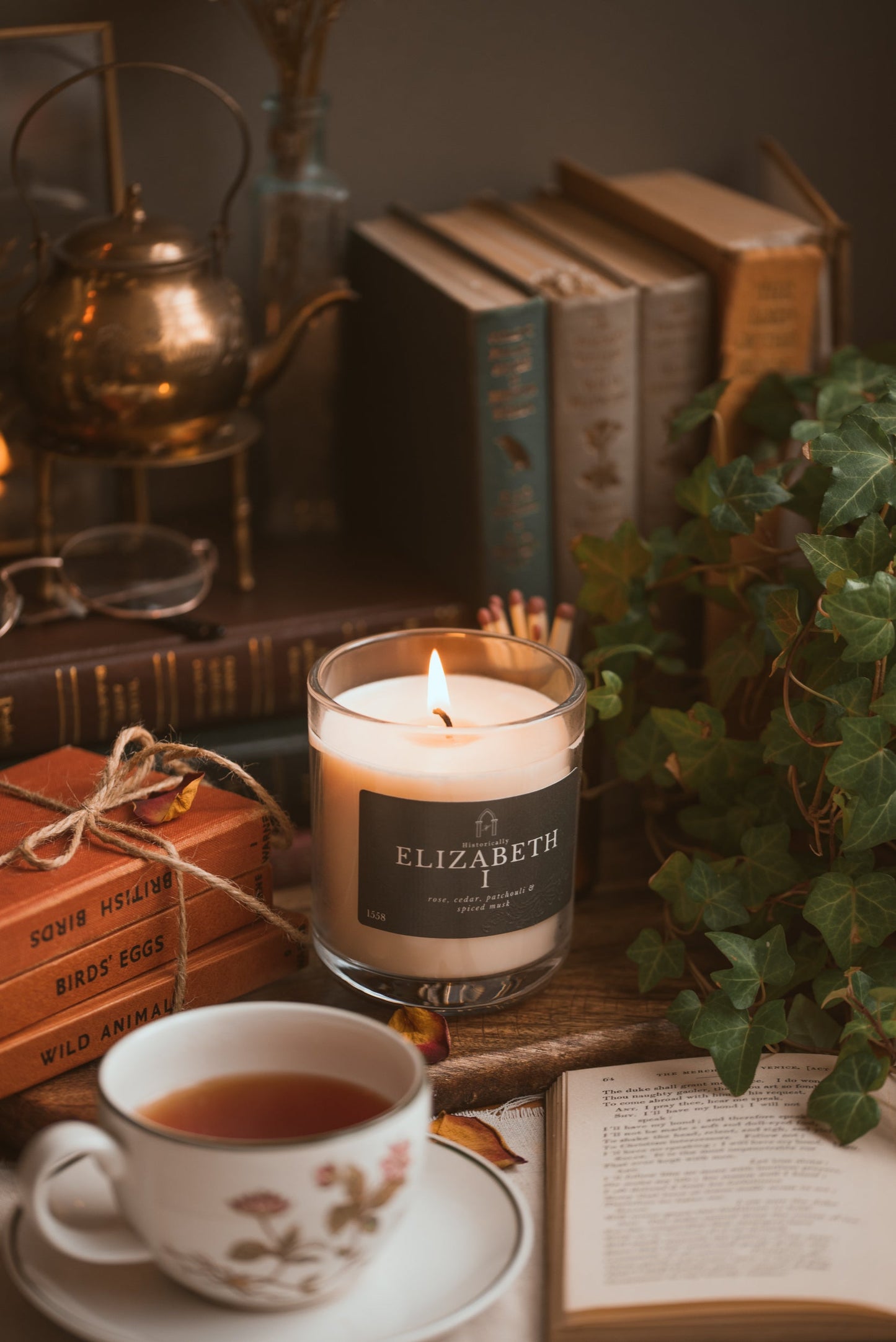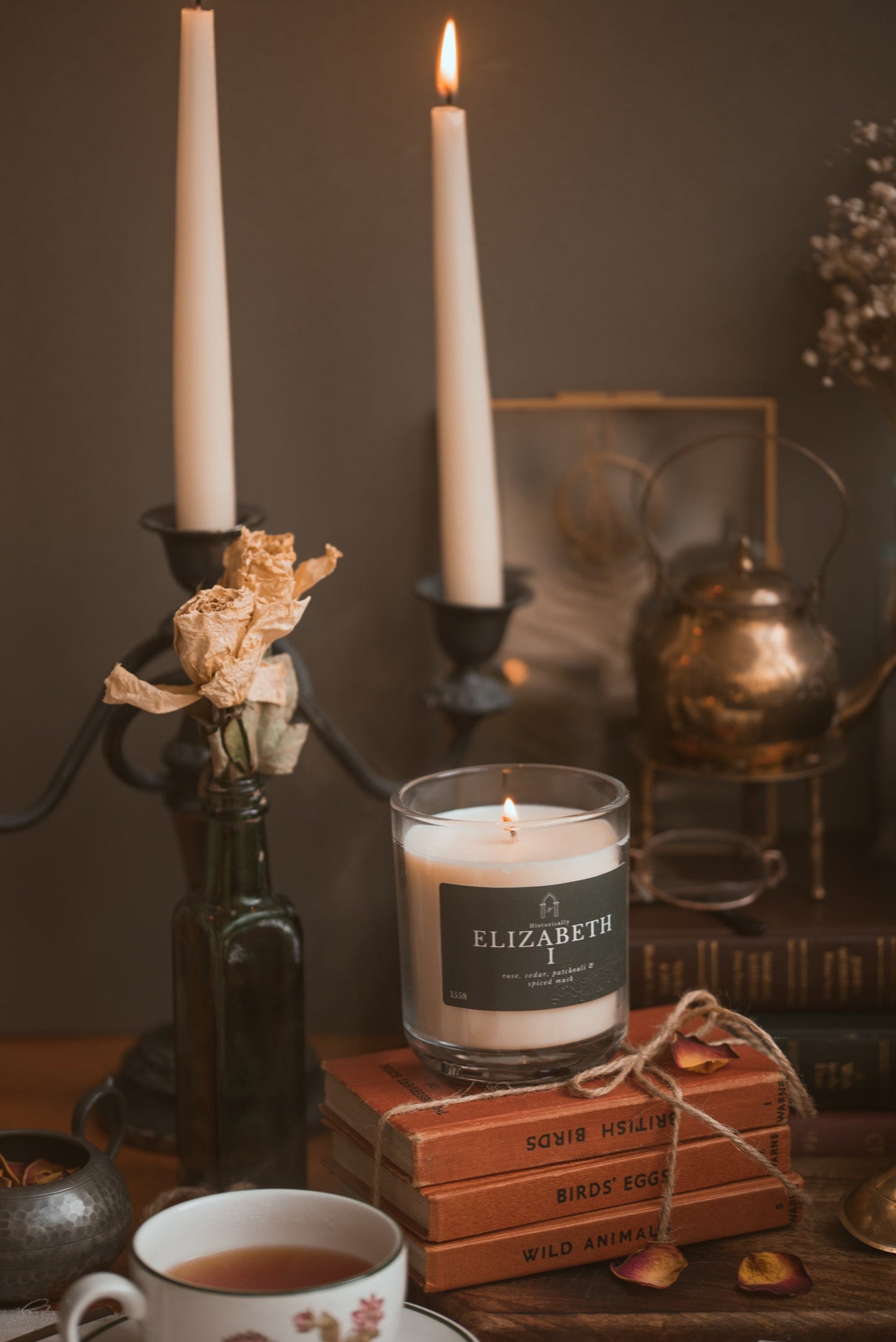Historically
Elizabeth I
Elizabeth I
Couldn't load pickup availability
Elizabethan Majesty: Gloriana.
In the heart of the Tudor court, a sovereign rules with grace. The emblematic Tudor rose mingles with sturdy cedar, crowned by a touch of spiced musk. A fragrance that captures the strength and elegance of Elizabeth I's golden reign.
Share
Scent Notes
Scent Notes
rose petals, cedar, patchouli & spiced musk
Delivery & Returns
Delivery & Returns
Dispatch times
Our candles are made to order and most will take between 1-7 business days to dispatch.
However, if you are wanting your order sooner or for a specific date please get in touch (via email or in the message box at checkout) and we can sort something out for you!
Delivery Times
We currently offer standard delivery with Royal Mail 2nd class which should arrive between 2-3 days after dispatch and Royal Mail 1st class which should arrive between 1-2 days after dispatch.
NOTE: Please note that during the months of November and December we use Royal Mail Tracked. This is more expensive than normal but we have found means that your parcels are safe and get to you in time.
Shipping outside the UK
We are more than happy to ship to America and Australia, unfortunately we cannot ship to the EU at this time.
If you would like an order to be delivered to Australia please do not hesitate to contact us via our contact page, email or Instagram message and we will calculate the shipping costs for you and complete your order via invoice.
Please note that customers are responsible for paying any import VAT, taxes and fees.
What is your return policy?
Please note earrings cannot be returned and refunded for hygiene reasons.
We are happy to accept returns if you are unhappy with your purchase.
Contact us within: 14 days of delivery
Dispatch items back within: 30 days of delivery
Request a cancellation within: 24 hours of purchase
Buyers are responsible for return postage costs. If the item is not returned in its original condition, the buyer is responsible for any loss in value.
Item damaged in transit
Sometimes accidents happen.
If you receive a parcel that has been damaged in the post please send a picture to us showing the damage within 48 hours of your parcel being delivered and we can discuss options with you. No worries.
Safety Information
Safety Information
Contains d-Limonene (R)-p-Mentha-1,8-diene and alpha-iso-Methylionone. May produce an allergic reaction.
I. Keep candles away from curtains, fabrics, furniture, and draughts.
II. Avoid placing candles under shelves; maintain a 3-foot (1-meter) clearance above.
III. Prevent contact with clothes and hair; place candles out of reach.
IV. Keep children and pets at a distance from candles.
V. Maintain at least 4 inches (10cm) between burning candles.
VI. Extinguish before moving; avoid objects falling into hot wax.
VII. Never leave burning candles unattended.
VIII. Safely extinguish with a snuffer or spoon, not by blowing.
IX. Double-check to ensure candles are completely out.
Scent History
Scent History
Rose:
Roses have held enduring significance throughout history. In ancient civilizations like Egypt and Greece, they symbolized love and beauty, often used in perfumes and associated with deities like Aphrodite and Venus. Romans extensively cultivated roses for ornamental and religious purposes. Medieval Europe saw roses as emblems of royal houses, notably in the "War of the Roses" between Lancaster (red rose) and York (white rose). Rose cultivation continued to evolve in the Renaissance, resulting in the diverse rose varieties we have today, including tea roses and hybrid perpetuals in the 18th and 19th centuries.
Cedar:
Cedar boasts a rich history spanning millennia, utilized by ancient civilizations like the Sumerians and Egyptians for construction and even embalming due to its durability and natural resistance to decay. It held biblical significance in the construction of Jerusalem's Temples, symbolizing strength and longevity. Native American tribes, especially in the Pacific Northwest, valued cedar for crafting canoes, totem poles, and longhouses. Cedar chests gained popularity in the 20th century for their ability to repel insects. Today, cedar remains cherished for its aroma, durability, and resistance to decay, serving as a valuable resource in construction, furniture, and woodworking, while its historical importance endures worldwide.
Patchouli:
Patchouli, with its earthy and musky scent, has ancient roots, likely originating in Southeast Asia, particularly Indonesia and the Philippines. Initially used for medicinal and aromatic purposes, it held such importance that Tutankhamun was buried with 10 gallons of it. During the 19th century, patchouli gained international recognition when traded to Europe, notably in Victorian England, where it scented fabrics and confirmed their authenticity. The 1960s counterculture movements further popularized patchouli for its association with freedom. Today, it remains a prized ingredient in perfumery and aromatherapy, embodying a journey from ancient healing traditions to a symbol of individuality and cultural significance.
Musk:
Musk has a captivating history in the world of perfumes, with a significant link to Queen Elizabeth I of England. During her reign in the 16th century, she was a perfume enthusiast, even having a personal perfumer, Charles L'Écluse, who created custom scents for her. One renowned perfume of the era, "Eau de Cypre," a musk-based fragrance, was believed to be her favorite. This perfume combined musk with botanical ingredients to create a luxurious scent. Musk, originally obtained from musk deer, was a vital component in perfumes of the time, albeit at the cost of endangering these animals. In later centuries, the development of synthetic musk offered a more sustainable option for creating musky fragrances.




